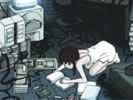Eye For Film >> Movies >> Serial Experiments Lain (1998) Film Review
One whole year before Western viewers were being dazzled by The Matrix, Japanese television audiences were being treated to a similar blend of the real and the virtual, the scientific and the spiritual in Ryutaro Nakamura's Serial Experiments Lain - 13 episodes (or 'layers') of lysergic anime whose sparse beauty, convoluted narrative and mindbending obscurantism made the Wachowski brothers' output look like child's play. For while Serial Experiments Lain may focus on a young schoolgirl, this is no giggling bubblegum 'toon, rather it is sophisicated animation for adults that will leave its viewers confounded, disturbed and strangely moved.
As painfully shy Lain Iwakura goes about her daily routines - taking the train to the city, daydreaming in class, walking along the street outside her home - like so many other 13-year-old girls, she feels disconnected from her parents, her sister, and even her friends. Yet when she starts receiving strange e-mails from a classmate who recently committed suicide ("I have only given up my body"), Lain decides it is time to be initiated into the mysteries of the online world known as the Wired, and discovers a place there where, for once, she seems to belong.

Except that, no matter whether Lain is online or off, mysteries keep compounding all around her. Who, for example, is sending her illegal devices to attach to her new computer? Who is the other, far less reserved Lain who haunts both the internet and a club called Cyberia? Who are the shadowy hackers known as the Knights, and what is their purpose? Who are the Men in Black staking out her house? Why is the behaviour of her parents so odd? And who is the grey alien in the striped shirt? Why has a giant image of Lain appeared in the skies above Tokyo? Who or what is God? And is there any difference between man and machine, life and death, omnipresence and oblivion?
Suffice it to say, Serial Experiments Lain poses all manner of existential, theosophical and eschatological questions, while providing so intricate a polyphony of answers that it amply repays multiple viewings - and will still leave viewers scratching their heads in bewildered rapture.
If nothing in Serial Experiments Lain is easy to pin down, everything is awash with an eerie, disorienting atmosphere. Locations shift with the speed of a mouse-click, scenes blur into one another according to their own hidden logic, and the breathtakingly psychedelic artwork renders streets and cityscapes as inchoate, half-blank sketches. Only the telegraph poles and wires that convey the computer data so crucial to the story are ever fully visualised and realistically detailed - while the amplified sound of their electronic hum dominates the hallucinatory soundtrack. For, apart from the fact that information is being transmitted and exchanged, one can never be certain what is actually going on in this stylised construct of a world, whose components relate to reality in much the same way that the medium of animation relates to live action.
As a trippy tale of a young girl's computer-assisted coming-of-age, Serial Experiments Lain is like Lewis Carroll's Alice stories reimagined through a scanner darkly by David Cronenberg and William Gibson. Indeed, Lain is at one point guided by a disembodied grin ("stupid Cheshire Cat wannabe", she comments). She is also helped on her way by various reality-shifting substances (although these are nanotechnological computer upgrades rather than Lewis Carroll's psychogenic mushrooms and 'Drink Me' potions) and her best friend is actually called Alice (or, in the Japanese, Arisu).
Yet, despite its virtual reality themes, Serial Experiments Lain ends up having far less to do with the gun-toting heroics of The Matrix Trilogy than with the downbeat paradoxology of Donnie Darko, Eternal Sunshine Of The Spotless Mind, or The Butterfly Effect. For this is an unremittingly sombre reflection on the nature of memory, identity and death - with even a Proustian madeleine making a cameo in the final episode to underscore both these themes, and the general mood of melancholy.
The increasingly isolated Lain, smiling only once in all of 13 episodes, does not depart in an explosive blaze of glory, but rather fades quietly away, not so much gone as merely forgotten. Lain's final act takes the story right back (with Moebean irrationality) to the teen suicide with which it began, and the effect is both unsettling and extraordinarily affecting.
While it is ultimately left unclear whether Lain is an avatar of the collective unconscious, a piece of background spyware, a new messiah for the information age, a ghost in the machine, or just a little girl lost, her cyberpunk Adventures in Wonderland are really no more or less inscrutably enigmatic than the hopes, dreams, anxieties and confusions of any adolescent - or than any page of raw computer code. They are, however, riveting to watch and, unlike their withdrawn heroine, impossible to forget.
Reviewed on: 04 Oct 2006

















